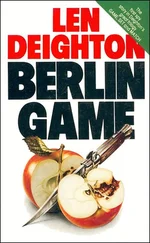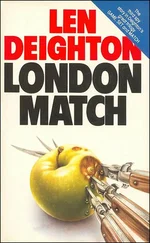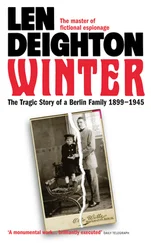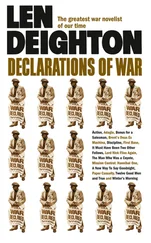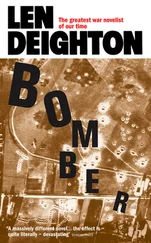‘Yes, sir,’ said Dunn. ‘That’s him all right.’
‘Christ! This one next to him is the dead man in that Shepherd Market murder!’
‘Shall I ask the photo agency if they have a record of anyone buying an extra print of this photo?’ said Dunn. ‘It’s been sent here to this address.’
‘It’s worth a go,’ said Douglas. He made another circuit of the room; walls, cupboard, floorboards, all without marks of recent disturbance. Nothing hidden in the cistern of the WC, only accumulated filth on the cupboard tops, and dust under the carpet.
Douglas looked at the big kitchen table that had been pushed into a corner to make more room. He felt underneath to be sure that nothing was hidden there by means of sticky tape. Then he knelt down and looked under it too. ‘Look at that, Jimmy,’ he said.
Like most kitchen tables it had a cutlery drawer, and this one was concealed by the way the table was pushed against the wall. Together they heaved the heavy table aside until there was enough room to open the drawer.
It was a big drawer. In it there were a few spoons and forks, and a broken egg beater, but occupying most of the space there was an arm. It was a right arm made of lightweight unpainted alloy that had come to pieces after a nut and bolt had loosened. Douglas knew exactly the part it needed, and, with the stagecraft of an amateur conjurer, he took it from his pocket and held it in place.
Dunn gave the low appreciative whistle that was obviously expected of him.
‘That’s enough for me,’ said Douglas. ‘That came from the scene of the murder. I wonder if it was loosened in a struggle?’
‘The Peter Thomas shooting?’
‘We can start calling it the William Spode shooting from now on, Jimmy.’ He put the piece back into his pocket and replaced the false arm in the drawer. There was a paper bag there too. He looked inside it and found a well-worn, but well-cared for, Leica camera. There were some accessories too; extension rings, filters, lens hoods and a set of four legs, tied together with string to which was also tied a large ringlike holder for them. ‘Worth a few pennies, that lot,’ said Douglas. They replaced the things and moved the table back against the wall.
‘Leica cameras have become a second currency,’ said Dunn. ‘I know a man who’s invested his life savings in a couple of dozen of them.’
‘Sounds like a dangerous investment,’ said Douglas.
‘But so is paper money,’ said Dunn. ‘So you think the dead man was misidentified?’
‘We’ll never prove it was deliberate,’ said Douglas. ‘They’ll all insist that they did it in good faith. But I’d bet my month’s tobacco ration that they were lying.’
‘Why, sir?’
‘Too many witnesses telling me the same thing, Jimmy.’
‘Perhaps because it was the truth, sir.’
‘The truth is never exactly the same thing,’ said Douglas. ‘You say this fellow Spode is at the school this afternoon?’
‘Should be,’ agreed Dunn. ‘Are we going round there?’
‘I’ll phone Central first,’ said Douglas. ‘I think my new boss will want to get into the act.’
Douglas Archer’s prediction proved correct. Standartenführer Huth, in the words of Harry Woods, provided ‘a typical example of SS bullshit’.
Beech Road School was the same sort of grim Victorian fortress in which so many London children spent their days. On one side there was a semi-derelict church, a paved part of its graveyard provided the recreation yard for the school. What a place to consign a child to waste away a precious youth, thought Douglas. Poor little Douggie.
A teashop faced the school. In other times it had been a cosy little den, smelling of Woodbine cigarettes, buttered toast and condensed milk. Douglas remembered it from when he was a young detective, its counter buried under slabs of bread pudding; heavy as lead and dark as thunder. Now the tea-urn, its plating worn brassy, provided only ersatz tea, and there wasn’t enough warmth in the place to glaze its window with condensation.
‘We have four platoons of infantry in reserve,’ Huth told Douglas. ‘I’m keeping them out of sight. The rest of the men have the block surrounded.’ Douglas went to the door of the café and looked out. The men were in full combat order, from battle-smocks to stick grenades in the belt. There were lorries in Lisson Grove, and standing alongside them were the mass-arrest teams, complete with folding tables, portable typewriters and boxes of handcuffs.
Douglas knew that it was official German policy to make ‘the enforcement of law and order a demonstration of the resources available to the occupying power’ but he didn’t expect this.
‘You should have let me do this alone,’ Douglas told Huth.
‘I want to show these people that we mean business,’ he replied. ‘Let’s go and get him, shall we?’
The men walked across the road. A soldier laughed. Douglas looked back to where the assault teams were standing together in those relaxed postures that soldiers assume the moment they’re given the chance. He wondered if the SS soldiers would obey an order to open fire on the school. If he knew anything of children, they’d be pressing their noses against the windows by now – or fretting for permission to do so. Anxiously he looked for his son’s face but didn’t see him.
As they stepped into the entrance hall, a fussy porter came to greet them. There was a false calm in the air, as if the school had been ordered to ignore the military activity in the street outside.
‘What can I do for you, gentlemen?’ said the porter.
‘Get out of my way!’ said Huth. ‘Where’s the headmaster – hiding under his desk?’
Douglas said to Huth, ‘Standartenführer, this man is the subject of my inquiries. I must insist that his civil rights are not infringed. I will be the one to take him into custody.’
Huth smiled. ‘We’re not going to shoot him “while he tries to escape” if that’s what your little speech is about.’ He stepped forward, opened the swing doors through which the porter had disappeared, and shouted, ‘Hurry yourself, headmaster, damn you!’ into the dim corridors. Then he turned back to Douglas Archer and said, ‘Too many questions remain unanswered for him to be endangered at this stage of the game.’
The headmaster arrived in a fast walk that would not have disgraced an athlete. ‘Now what is the meaning of this interruption?’ he asked in the sort of voice Douglas had not heard since he was at school.
Huth turned to look at the headmaster. Then he took his silver-topped stick and reached forward until it touched the man’s chest. ‘Don’t,’ said Huth, pausing for a long time during which the silence was broken only by the headmaster’s heavy breathing, ‘…talk to me…’ Huth spoke very slowly, prodding him to emphasize the most important words, ‘…or to my police officers like that. It provides a poor example for your pupils.’
The headmaster’s eyes popped open very wide, and the measured speech, and dignified tone, gave way to a gabble. ‘Is this about the Spode fellow? Wish I’d never given him a job. He’s been nothing but trouble, and I’m not sure he’s been loyal to me…’
‘Where is he?’ said Huth, still speaking as if to a small child.
‘Spode?’
‘Who else could I mean? Do you think I’d pop in and consult you about the whereabouts of Reichsmarschall Göring?’ – a long pause – ‘…or about the whereabouts of the King of England, the Queen and the two Princesses?’
‘No, indeed. Very amusing, Herr Colonel. The King…well, ha, ha! I know the King is at Windsor with the Royal Family and they are all in very good health. I read the bulletin about that, and I make sure that all my staff know I won’t tolerate the disgraceful rumours about His Majesty being confined in the Tower of London.’
Читать дальше



